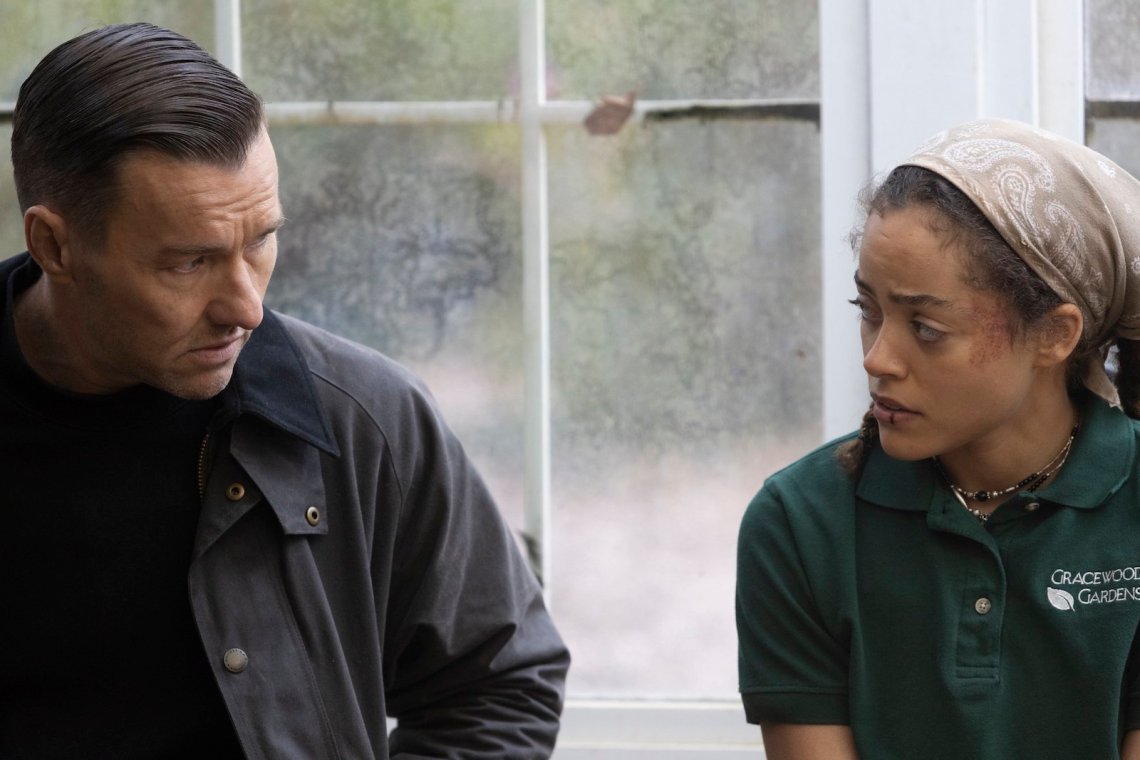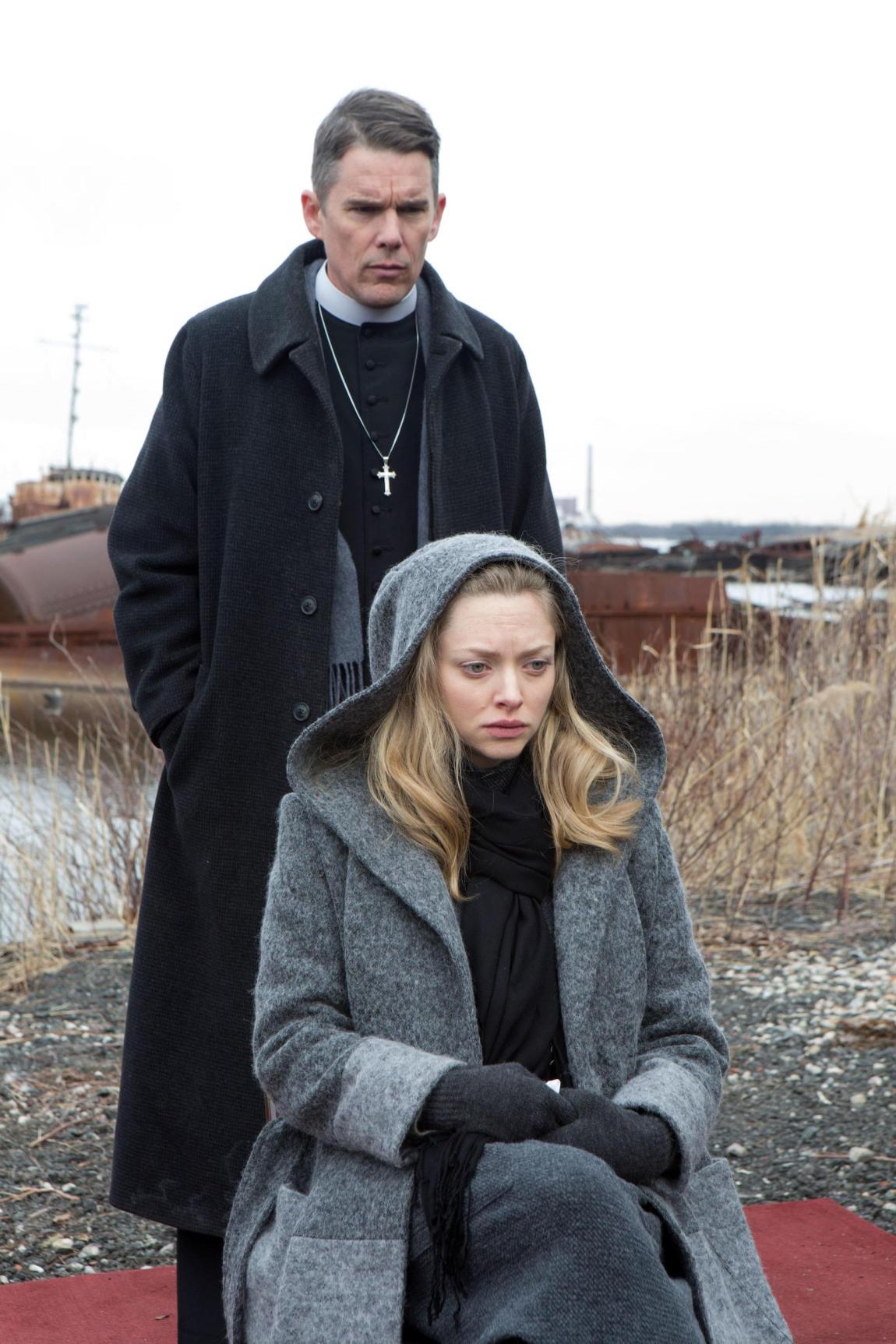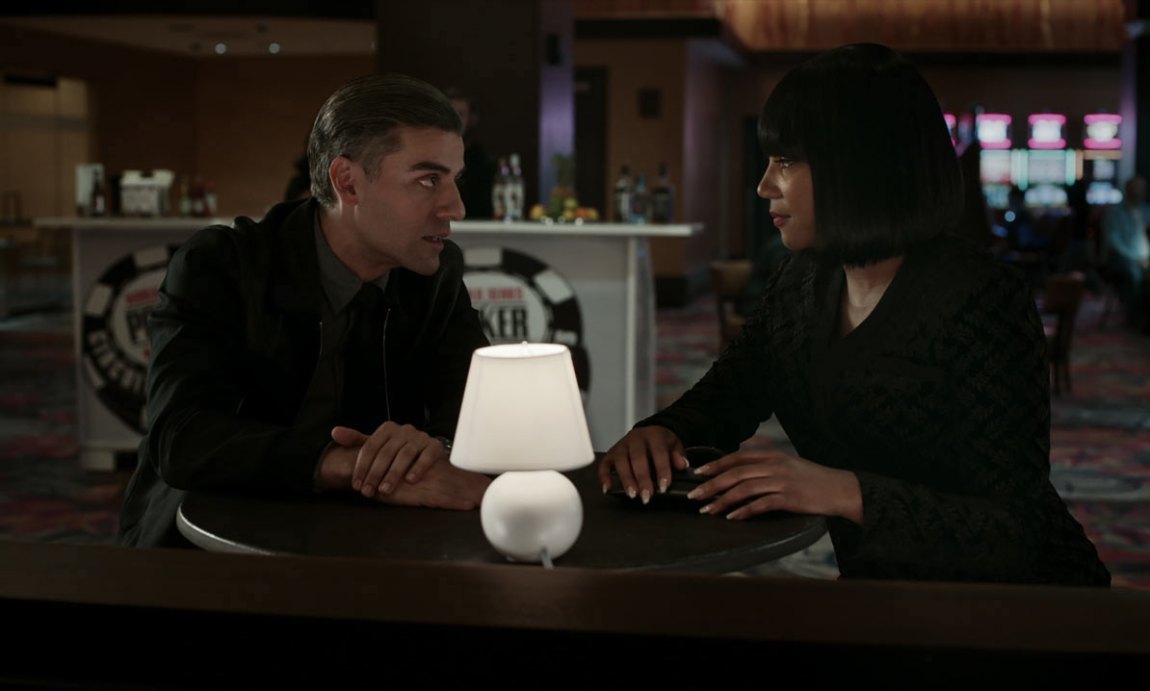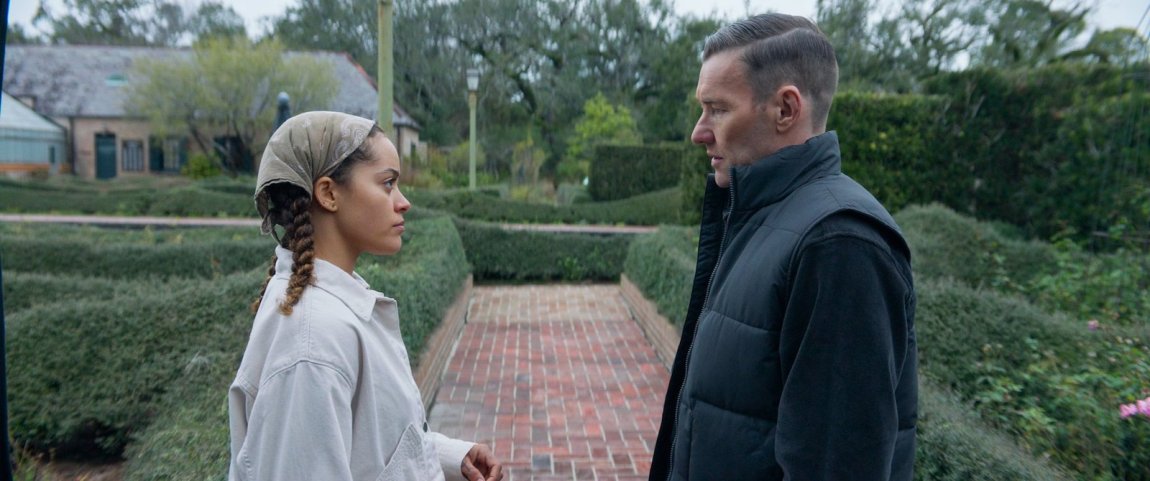No one would call Paul Schrader an especially funny filmmaker, but he has made at least one truly hilarious movie: his contribution to Venice 70: Future Reloaded, an omnibus film created for the seventieth anniversary of the Venice Film Festival in 2013. Schrader’s entry is a ninety-second short, codirected with his former assistant Andrew Wonder, in which he strides down the High Line park in New York City while wearing a rickety, ludicrous rig of digital cameras. Three are on spindly arms mounted to a harness around his waist, and another protrudes off his neon green helmet; all four are pointed at his face. The film cuts frenetically from angle to angle as Schrader fumbles with his glasses, gulps water, huffs and puffs past confused pedestrians, and delivers a mini-lecture on the current state of the cinema. Movies are in “a crisis of form,” he declares. “We don’t know quite what movies are—we don’t know how long they are, we don’t know how you see them, where you see them, how you pay for them…. Every week brings another change.”
Schrader had always been an incongruous figure among his New Hollywood peers, the filmmakers who, starting in the late 1960s, made “about fifteen years of interesting films,” as he puts it in the Venice short. A film critic turned screenwriter turned writer-director, he was most famous for his scripts for other people’s movies—Martin Scorsese’s, most of all, including Taxi Driver (1976) and Raging Bull (1980), as well as Brian De Palma’s, Sydney Pollack’s, and more. Even as a director his work was defined more by a consistent, contradictory set of thematic fixations than by any particular visual style: a half-horrified fascination with sleaze and glamour and with violent, alienated men; narratives structured around spiritual sickness and the possibility of redemption, often with self-conscious borrowings from other films. His greatest work from this time was probably American Gigolo (1980), a film of glittering, seductive surfaces—it is often credited with popularizing the clothing of Giorgio Armani and making Richard Gere a sex symbol—that gets sadder and sadder as it goes. Its ending was lifted wholesale from Robert Bresson’s Pickpocket (1959): the protagonist in prison, suddenly expressing his love for the woman who visits him.
Even well after the end of those fifteen golden years, Schrader managed to get odd, uneasy, fascinating films made. (The early-Nineties pair The Comfort of Strangers and Light Sleeper were especially pleasing, by which I mean quietly harrowing.) But by 2013 his movies did seem like the work of someone struggling—or perhaps flailing—against the shifting currents of his medium. The Canyons (2013), which starred Lindsay Lohan and James Deen, better known as a pornographic actor (and accused a few years later of a variety of sexual abuses), was notorious even before its release for its difficult, low-budget production. The film itself—a bleak erotic thriller set on the fringes of Hollywood, punctuated by photographs of abandoned, decrepit movie theaters—seems almost disgusted by its own existence, as if its dreary writing and stilted acting are meant to exemplify how far movies had fallen.
Dying of the Light (2014), a glum, drab spy story about a CIA agent suffering from dementia, was reedited and otherwise altered by its producers during postproduction. Schrader eventually responded by releasing an unauthorized director’s cut cobbled together using DVDs of rough drafts of the movie. This version, titled Dark, is twenty minutes shorter, with an “aggressive editing style” meant to mirror the main character’s mental decline: with its jagged cuts and low-res zooms, the film seems to be tearing itself apart as you try to watch it. The scuzzy Dog Eat Dog (2016) was more conventionally satisfying, though that’s a very low bar: its gleefully incoherent mix of comedy and cruelty is at its best in the supporting performance by Willem Dafoe as a hoodlum who chatters endlessly in earnest self-help lingo while committing atrocious acts of violence. It might have seemed like this late phase of Schrader’s long career was following a recognizable arc: he was learning at least to enjoy the chaos of twenty-first-century filmmaking, if not to control it.
*
All of which made the release of First Reformed the next year a genuine shock, like a sudden, ominous stillness in the middle of a storm. From its opening shot—a slow dolly toward an old white wooden church building, as night gives way to day—it announces itself as an entirely different sort of movie. The story of a lonely, grieving minister (Ethan Hawke) giving in to despair over the destruction of the environment is told with a carefully restrained style: long takes, little music, almost no camera movement, most of the action limited to quiet conversations. “The world is changing so fast—and right in front of us,” an anguished young parishioner tells the priest, and of course he means global warming and mass extinction, not the coming of digital projection. The crisis of cinema has been overtaken by a crisis of far greater significance.
Advertisement
The result was the best film of Schrader’s career. It is also, he has said, “a movie I always didn’t want to make,” the sort of story he’d been running away from ever since he’d abandoned his Calvinist upbringing for Hollywood: austere, minimalist, openly spiritual. And yet it was a film he was always on the verge of making. Like much of his best work—Light Sleeper, American Gigolo, Taxi Driver—it was written under the sign of Bresson’s Diary of a Country Priest (1951), structured around a solitary man writing down his thoughts, trying and failing to hold himself together. Schrader has called this trope “God’s lonely man” or, more modestly, “the man in the room.”
In his earlier films the deranged worlds his men saw around them were expressions not of reality but of their own derangement: Travis Bickle’s “open sewer” New York, Julian Kaye’s loveless LA in American Gigolo. In First Reformed, that internal sickness finds its equal in the world. Father Toller is sick at heart and in body, and his mind slips more and more as the movie progresses—but the sickness he sees in the world is real, and agonizing. We see it too, all around us, every day. We breathe its smoke, feel its heat, count its dead. As Toller tells Mary, the wife of his anguished parishioner, after her husband has blown his head off with a shotgun: “Michael was troubled but his cause was just.” The justice and the trouble: the film holds them up together, shows us Toller trying to tease them apart, to keep his eyes on the true cause as his troubles grow, and shows him failing.
Some viewers, especially those who come to it already deeply engaged with the problem of global warming, have seen First Reformed as unnecessarily—or perhaps counterproductively—morbid. Daniel Goldhaber, the director of this year’s stirring eco-terrorist heist movie How to Blow Up a Pipeline, has said that he “loved” Schrader’s film, but used it as an example of “things we did not want to do” because it failed to represent the current situation as anything other than “a tragedy. It can’t imagine climate resistance as something more than an extension of, like, toxic masculinity.”
Others don’t think it’s even really about the environment at all. The critic Masha Tupitsyn, in her introduction to the published version of First Reformed’s screenplay, writes that “a film critic friend” told her that “Schrader doesn’t care about planetary apocalypse. It’s just a MacGuffin.” She ends up more or less agreeing: “The environmental catastrophe that is supposedly at the center of First Reformed is a plot mechanism for Schrader’s ongoing transcendental themes.”
There is something to this. Schrader followed First Reformed with two more films in the same mode, though neither is quite as stylistically restrained. Each focuses on a lone, furiously journaling man struggling with guilt over a vast societal wrong and sliding toward violence. In The Card Counter (2021) that wrong is the so-called war on terror, specifically the abuses at Abu Ghraib; in his newest film, Master Gardner, it is white supremacy. This loose trilogy could be seen as a series of mashups, in which Schrader’s “man in a room” meets selected objects of liberal doomscrolling outrage (and Schrader does have a vociferous social media presence, to put it gently).
But one might just as easily see the reverse. Schrader has repeated his “man in a room” schema so many times that I’m not sure it really functions as subject matter anymore. It feels instead like a kind of method, a way of using cinema to look outward at the world and think it through. The lonely man is a device that allows Schrader to take on subjects that might otherwise be too big to approach, too urgent, unwieldy, or impersonal. It becomes an acid in which these problems can be dissolved, so we can study their bones.
*
Part of the power of this trio of films—and they are undeniably powerful—comes from this use of filmmaking as a mode of contemplation: sustained but not static, rigorous but not bloodless, ever-changing but never quite resolving. The Card Counter is in many ways a logical progression from First Reformed. The Iraq War lurks in the background as the reason for Toller’s loneliness: his son was killed in that “war that had no moral justification,” as Toller puts it, just six months after enlisting with Toller’s encouragement. His wife, who opposed their son’s enlistment, has left him. In The Card Counter we gradually learn that the titular gambler, who now goes by William Tell, is an ex-soldier who was court martialed and imprisoned for participating in the abuses at Abu Ghraib—an imaginary member of the tiny cohort of low-level soldiers who were actually punished for those crimes.
Advertisement
Oscar Isaac plays him as a man of terrifyingly rigid control, so disgusted by what he has seen and done that he can hardly bear to touch the world. He moves through an endless deadening series of casino floors, conference rooms, and hotels. (Where First Reformed was about the degradation of nature, in The Card Counter nature is almost completely absent.) Every night before he sleeps he removes all the pictures from the walls of his room and wraps all the furniture in white sheets, converting the space into a kind of blank purgatory: a visual metaphor for the despair around which the film revolves.
Both First Reformed and The Card Counter use black characters as foils for their protagonists. In First Reformed it is Reverend Jeffers, the charismatic, entrepreneurial head of the Abundant Life Church, of which Toller’s First Reformed is an antiquated subsidiary. Jeffers chastises Toller for his rigidity and morbidity—for being “always in the garden,” as he puts it—and in a simpler film he might seem no more than a sellout, tempting Toller away from moral seriousness. Instead, what he is advising is a greater engagement with the world, in which compromise goes hand in hand with service to others and kindness to oneself.
In The Card Counter this figure is La Linda, who manages a stable of card players and encourages Tell to switch from his careful blackjack to riskier, more remunerative high-stakes poker. He eventually does, and the two enter into a tentative romance. Somewhat like Jeffers, what she offers is a mix of love and capitalism, an ambiguous worldliness. And, like Jeffers, who is played by Cedric “The Entertainer” Kyles, she is played by a very successful black comedian: Tiffany Haddish.
Schrader used a similar casting maneuver in his directorial debut, Blue Collar (1978), pitting the Method intensity of Harvey Keitel against the improvisatory talent of Richard Pryor. There the contrast was deliberately explosive, as Keitel and Pryor’s characters go from mismatched union buddies to co-conspirators in a burglary to bitter enemies; the film famously ends with a vicious, epithet-filled fight between them. In First Reformed and The Card Counter the contrast is more muted. Kyles and Haddish give warm, casually commanding performances, and both characters feel natural in their respective films, but they sit a little less easily when considered together. There seems to be some argument lurking in the subtext—or perhaps simply a set of assumptions—but it’s hard to make it out.
*
Master Gardener makes race the center of the text. The man in the room this time is Narvel Roth, the live-in head gardener of an elaborate southern estate called Gracewood Gardens: a man who tells his journal things like “gardening is a belief in the future. A belief that things will happen according to plan,” and “the seeds of love grow like the seeds of hate.” We soon learn that he is also a former member of a violent white supremacist gang—flashbacks intrude periodically, and we get a look at his torso, covered in neo-Nazi tattoos. It seems clear that this will be an attempt to treat America’s legacy of racist violence using the same contemplative devices as the previous films: lonely agony, fitful engagements with a few representatives of the wider world, a slow build to violent rupture. All the more so when the plot gets going and Norma, Gracewood Gardens’ owner, asks Narvel to take on her twentysomething mixed-race (or “mixed blood,” as Norma puts it) grandniece as an apprentice.
This time, though, the mechanism begins to break down almost as soon as it starts up. Master Gardener is a strange, contradictory film—less coherent than its predecessors, and less convincing. (Alex Abramovich reported in The New Yorker that, after a screening of an early cut of the film, Schrader asked a friend, “How much trouble am I in?”) Its storytelling is oddly impatient. The flashbacks to Narvel’s violent past are abrupt and didactic. Previous films used a range of acting styles: The Card Counter sets up a productive clash not only between Isaac and Haddish but also between them and Tye Sheridan’s mumbly, recessive performance as a young man Tell tries to protect and Willem Dafoe’s more expansive, theatrical portrayal of the retired officer they eventually confront. But in Master Gardner the mismatch goes deeper.
Several of the main characters seem like different people than the story seems to be telling us they are. Narvel, played by Joel Edgerton, looks more fascistic after his reformation than he does in the past: he is shaggy and unkempt in flashback but now sports a side-slicked undercut and a wardrobe of almost fetishistically antiquated work clothes. And yet Edgerton gives him a courtly gentleness that makes it hard to imagine how he ever got all those tattoos; he feels neither like someone who consciously rejected neo-Nazism nor like someone who could ever really have been tempted by it. The flashbacks are too thin and brief to convince us otherwise. The film, like its predecessors, is structured around his agonizing, but his chief quality, past and present, seems instead a sort of baffled dutifulness.
His young apprentice, Maya, is ostensibly a drug addict, periodically abused by a dealer for whom she sometimes works, but the film shows us someone else: a grounded, untroubled young woman, played by Quintessa Swindell with a mix of amusement and wary intelligence. The scenes in which she shows up to the garden with a bruised face or, later, in which she and Narvel confront the dealer and his cronies are among the most schematic and underdeveloped in the film. It’s the parts that don’t fit that feel the most alive: Edgerton’s and Swindell’s performances are vivid and complex, more convincing than the plot to which they are affixed.
Narvel and Maya are attracted to each other—an attraction complicated not just by the disparity of their ages, her position as his employee, and Narvel’s past, but also by the fact that Narvel is in a long-running sexual relationship with Maya’s great-aunt Norma. Sigourney Weaver’s performance as Norma is the most harmonious in the film: she is imperious, touchy, and affectionate without ever seeming the least bit maternal, a woman who gives orders so easily it can seem like elegance, until she’s disobeyed. She calls Narvel “sweet pea” and summons him periodically for dinner and sex.
Even before it’s quite begun, Narvel and Maya’s affair gets them fired and kicked out of Gracewood. Narvel threatens her dealers and in response they vandalize the gardens. (For a pair of small-time crooks, they do a surprisingly thorough job.) All of this feels artificial, a little arbitrary. The film’s emotional energy seems most invested not in any of the movements of the plot but in a single image, repeated throughout: Narvel’s bare body.
None of the main characters can look away. Narvel stares at himself in the mirror after undressing; we learn that he has declined to get any of the tattoos removed, long after he has renounced their meaning. Norma demands he undress in front of her, and her eyes linger on his torso with an obscure hunger: “Let me see you.” After he and Maya leave Gracewood together, he lets her catch a glimpse of his tattoos as a way of telling her about his past, and perhaps a preliminary form of seduction. “I thought you should know I was once someone else,” he tells her. Later, before they sleep together for the first time, she instructs him to take off his clothes and turn around so she can see the swastikas and other symbols on his back. She makes him promise to have the tattoos removed, but the exchange feels obligatory. More important is the long, slow survey that precedes it. For her, as for Norma and Narvel himself—and for Schrader, it would seem—this body is irresistible, an unanswered question about the erotic power of sin and hate.
The violence in the final act is perfunctory, gratuitous not because it is particularly explicit but because it seems so taken for granted that this is where the story should go. “You wanted them dead, now here they are,” Narvel tells Maya, holding her erstwhile dealers at gunpoint—though there’s been no particular indication before this that she did, in fact, want them dead, and these men seem more scummy than evil. She takes the gun, thinks it over, then spares them, so Narvel breaks their kneecaps with a hammer.
Strengthened, somehow, by this encounter, they return to Gracewood Gardens, and Narvel tells Norma that he and Maya will live in his cabin on the estate “as husband and wife.” “That is…obscene,” Norma chokes out. (Narvel is a couple decades older than Maya, though Norma, in turn, is a couple decades older than him.) “No it’s not,” Narvel replies. “I’ve seen obscene.” As he returns to Maya, the film’s soundtrack for the first time features a human voice—until this point it’s been a synth-heavy instrumental score by Devonté Hynes, also known as Blood Orange. Now we hear the R&B singer Mereba performing a song called “Space and Time.” Narvel and Maya dance on the porch of his cabin, slow and gentle, as the camera pulls away and the credits roll. “I never want to leave this world,” Mereba sings, “without saying I love you.”
What’s especially troubling about this ending is how sweet and perfect the moment is: a beautiful song, a beautiful shot, Narvel and Maya the picture of domestic bliss. Yet it does nothing to resolve the contradictions of what has come before, or only does so in ways one is reluctant to accept. From one angle, the movie seems to be proposing a kind of pan-racial fascism: a healing through violence that unites the generations, and extends even to a white supremacist and a black woman. Master Gardener would then belong alongside David Mamet’s Redbelt (2008) and Clint Eastwood’s Gran Torino (2008): creaky, objectionable, occasionally stirring late-career odes to the balm of beating people up. Or maybe it is simply a petering out of inspiration and energy, the rogue wave that began with First Reformed finally crashing into the rocks.
From another angle, though, it appears not really to be about race at all—though it clearly thinks it is. Much of it, instead, seems to be about men and women and the power they have over each other. (“I’ve never thought too much about women, other than as women,” Narvel declares early on: not the most baffling line in the movie, but close.) Its central relationships are troubling and uncomfortable, deformed by age gaps and power relations; and yet both are tender and, in their way, genuinely affectionate. The performances, especially, bring them into truth. It is as if Schrader is pushing as hard as he can at the boundaries of acceptable onscreen love affairs, as a way to isolate the love. The repeated scenes of eroticized gazing at Narvel’s body may not really be about his racist past; the tattoos might be an excuse for that gaze rather than its object, a way to smuggle it into the macho mechanisms of a Schrader film. Narvel, in staring at his own body, could be imagining what it would be like to desire a man like himself: pondering the mystery not of his capacity for hate but of his capacity to be loved.
*
Sin is a way to understand how our individual actions could possibly matter to something infinitely bigger than us, and in First Reformed it becomes a way to grasp at the strange enormity of global warming—how it permeates the most mundane moments of our lives yet can seem too vast to have any hope of addressing. The sins at the center of The Card Counter and Master Gardener are more personal to the men who committed them, but not entirely—they seep out, and spread. William Tell has deadened himself to the world and the world around him seems half-dead, a purgatory of airless, anonymous spaces and empty activity. In Master Gardener the symbolism is even more direct: a garden, Gracewood, is ruined (the vandals even spraypaint swastikas inside Narvel’s cabin, though they have no way of knowing about his past).
Toller and Tell end up suspended between grace and damnation. Schrader has said that he left the ending of First Reformed intentionally ambiguous, and in The Card Counter he returns again to the paradoxical final shot of Pickpocket, with his protagonist newly imprisoned yet newly free. In Master Gardener he reaches for something else, for a picture of true absolution and peace. The ending is unsatisfying because it is so clearly unearned, so inadequate to the questions the film has asked. But the desire to end this way, with this moment, is affecting nonetheless.
It’s an odd, fucked-up film that wants, deep down, to be a love story. We all want to wind up like Narvel: accepted, embraced, whether we’ve earned it or not. “Can God forgive us?” Michael asked Toller in First Reformed. Now Schrader has tried to imagine that someone, at least, can.






